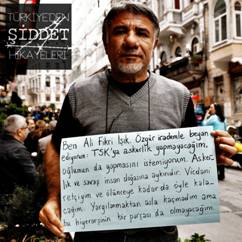The court rejected 56-year old conscientious objector Ali Fikri Isik’s demand for a change of judge. Ali Fikri was asked whether he wanted to change his plea but he reiterated what he had said in the previous courts – that he refused military service.
His lawyer Davut Erkan explained that a Conscientious Objector cannot possibly commit the crime of desertion, so the charge was not valid. He continued, in accordance with the relevant law, a person who exercises his rights cannot be punished, and since a Conscientious Objector is not a soldier, he cannot, by definition, attempt to desert the army.
The lawyer asserted that international agreements ratified by the Turkish Parliament recognize the right to Conscientious Objection. Article 90 of the Turkish Constitution stipulates that such international agreements are above national law, so the right to Conscientious Objection must be respected.
From Payday men’s network – original dated 5 November 2014, Çorlu Military Court, Turkey.
The placard says: “I am Ali Fikri Isik. With my free will I declare: I will not be a soldier of the Turkish Armed Forces. I don’t want my son to be one either. Being a soldier and war are against human nature. I’m a conscientious objector and I will remain so until I die. I have never attempted to escape trial but I will not be a part of this hierarchy.”
——————————————————————————–
When asked for his closing statement, Ali Fikri said that he never attempted to escape from being tried, that he’s a Conscientious Objector and that Turkey must accept its responsibilities after having signed international agreements. He added that if he was sentenced, he would regret having attended and having thus legitimized these trials to any degree. If the court didn’t follow ECHR decisions, it wouldn’t matter where he was tried and he’d rather be tried by the State Hydraulic Works Court or the Agricultural and Rural Works Court than a Military Court.*
The military court found Ali Fikri Isik guilty on three different counts of deserting the army and disobeying orders, sentencing him to a total of 25 months’ imprisonment converted into a monetary fine of 15.000 TL (20 TL per day) (about £4,000 or $5,700) divided into 24 installments. If the fine is not paid, the jail sentence would take effect.
Translated roughly from:
http://vicdaniret.org/askeri-mahkeme-vicdani-retci-isika-firardan-25-ay-hapis-cezasi-verdi/
* Translator’s note: soldiers have separate courts in Turkey; we don’t have Hydraulic or Agricultural Works Courts.
——————————————————————————–
The translator adds:
Although Ali had presented a report on February 2014 stating that he is unfit to serve in the army because of his health, this wasn’t taken into consideration by the judge as the alleged “desertion” took place prior to the health report. Although in this respect the court’s decision is not just, it can nevertheless be considered a victory that Ali was not imprisoned.
Ali declares that the result is in a sense pleasing for him, but he doesn’t see this as being his own case only, or solely a matter of Conscientious Objection. He sees Conscientious Objection as part of a broader struggle for the freedom of all. In such a struggle victories do not come all at once and the court’s decision does not amount to a complete victory either.
According to the workings of Turkish law, all court decisions have to be approved by the Supreme Court, and Ali’s lawyers will be filing an appeal against the current decision – not only because they don’t consider the decision just and because all internal legal processes need to be exhausted before taking the case to the ECHR, but mainly because Ali believes we should work within Turkey’s legal system and create disturbance to the state. Having Turkey found guilty by the EHCR is not particularly useful. So the next steps will be to take the case to the Supreme Court and then to the Constitutional Court (which rules whether the decisions of lower courts are in line with the Constitution).
Ali Fikri Isik thanks all supporters for their efforts, which mean a great deal in such cases in Turkey. International pressure is critical, whilst support from within Turkey is rather weak. Ali also points out that no parties have yet made the right of Conscientious Objection a political goal, and the public in general hasn’t reacted strongly on this subject because many don’t see CO as a fundamental human right. In this sense, international public support is crucial to setting an example.
——————————————————————————–
Circulated by:
Payday men’s network www.refusingtokill.net
UK: + 44 (0)20 7267 8698 US: 001 215 848 1120










